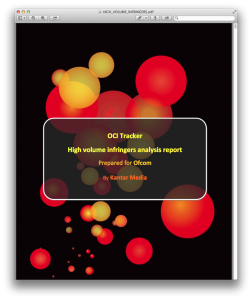NetNames Piracy Study Follow-Up: Even Incorrigible Infringers Can Still Be Good Customers
 Not long after I’d questioned the conclusions of an NBC Universal-backed study touting a wave of online copyright infringement, I was not too surprised to get an e-mail from the author of that report asking if we could have a longer talk.
Not long after I’d questioned the conclusions of an NBC Universal-backed study touting a wave of online copyright infringement, I was not too surprised to get an e-mail from the author of that report asking if we could have a longer talk.
And much as he was two and a half years ago, David Price didn’t sound quite as alarmed about the state of digital copyright as initial reports might have suggested.
First we discussed the gap in the availability of unauthorized copies of music and movies.
Price noted how much better legitimate access to music has gotten in the U.K. “The bands I liked in the ’80s that I can’t find anywhere to buy, I can stream,” he said. “It’s now easier to do the legitimate route than it is to do the illegitimate route.”
(Price’s aside that while the widespread availability of free, authorized music-streaming services is “wonderful for the consumer, it’s not so clear for the artist” brought up a sometimes-overlooked point: Musicians can make a lot more immediate money off sales of downloads and physical CDs than newer streaming services have allowed so far.)
But, Price said, the BitTorrent data cited in page 29 of his report leave out some infringing music traffic, on account of how “music churns on and off much quicker” on that peer-to-peer system.
With respect to the movie industry, Price agreed that the selection still doesn’t match to the availability of music online. He did, however, point to one positive development: online releases preceding physical ones.
“Pirated versions of [Blu-ray and DVD] will appear about three weeks before it hits retail, and that’s simply because of the enormous supply chain” he said. “What we’re starting to see is a much increased use of things like iTunes to release things online two or three weeks before it hits retail.”
For example, the latest Star Trek flick arrived on iTunes–$14.99 in standard definition, $19.99 in HD–three weeks before disc editions landed.
“The people I talk to at the studios, they’re not stupid,” said Price. “They realize they have to get this out there.”
That still leaves what you could politely call varying degrees of cluefulness among movie studios. Not all are sold on online-first home releases of movies, even as independent releases such as the sci-fi thriller “Europa Report” have made the Internet their primary outlet.
Finally, we turned to the NetNames report’s definition of an infringing user: anyone who had “downloaded or viewed at least one piece of infringing content… during January 2013.”
“To some extent, the easiest way to do it was to label anyone who’s downloaded once in a month,” Price said, but then allowed that these people are “not a homogenous group by any means.”
He suggested a recent report prepared for Ofcom, the U.K. government’s communications regulator, that went into more detail about digital-media consumption habits, authorized and otherwise. Kantar Media’s “High volume infringers analysis report” was an enlightening read.
This survey of U.K. users, based on 21,475 survey responses covering May 2012 to May 2013, found that only a tiny minority of users made up the vast majority of infringing uses.
“The data show that just 2% of internet users make up the top decile of infringers by volume, and these people accounted for three-quarters (74%) of all infringements,” the report’s introduction explains on page 2. “There is, therefore, a long tail of casual, low level or infrequent infringers.”
But at the same time, the self-reported digital-media purchases of these incorrigibles make them among the entertainment industry’s better customers. Kantar’s researchers found that infringing users spent more per quarter, £26.41, than non-infringers, £16.18–and the top 10 percent among them shelled out £54.72.
I understand Price’s concern when he speaks of what large volumes of habitual infringement say about “the culture of the Internet population.” (I’ll go one step farther than he did and suggest that if you grab a song off BitTorrent when you can pay $1 on Amazon or iTunes for a DRM-free copy, you may want to revisit your personal value system.)
But movie studios, record labels and book publishers aren’t moral enforcers or police agencies. They’re in business not to prohibit piracy, but to make money; judge their health by that metric first.








